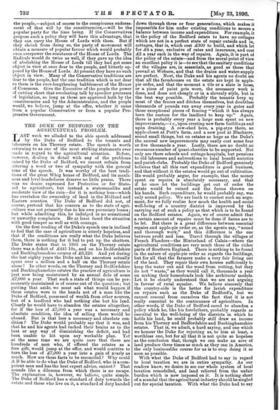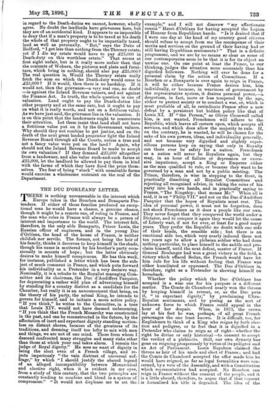THE DUKE OF BEDFORD ON THE AGRICULTURAL PROBLEM . .
TAST week we alluded to the able speech addressed J by the Duke of Bedford to the tenants and labourers on his Thorney estate. The speech is worth returning to as one of the most striking statements ever Iliad° in regard to the agricultural situation. Before, however, dealing in detail with any of the problems raised by the Duke of Bedford, we cannot refrain from uttering a word or two of sympathy with the general tone of the speech. It was worthy of the best tradi- tions of the great Whig house of Bedford, and its manli- ness and level-headedness deserve no little praise. There was no desire expressed for Protection or for State. aid to agriculture, but instead a statesmanlike and moderate view of the ruin—for it is nothing less—which has overtaken the ownership of land in the Midland and .Eastern counties. The Duke of Bedford did not, of course, pretend that his concern as to the state of agri- culture was not primarily due to his own pecuniary losses ; but while admitting this, he indulged in no sensational or unworthy complaints. He at least faced the situation with good temper as well as with courage.
On the first reading of the Duke's speech one is inclined to feel that the case of agriculture is utterly hopeless, and that if the conditions are really what the Duke believes them, there is nothing for it but to put up the shutters. The Duke states that in 1895 on the Thorne), estate there was a deficit of £445 10s., and on his Bedfordshire and Buckinghamshire estates of £6,320. And yet during the last eighty years the Duke and his ancestors actually spent over a million and a half on the Thorney estate atone! In other words, on the Thorney and Bedfordshire and Buckinghamshire estates the practice of agriculture is just now being maintained by an annual dole of some £7,000 a year. That such a state of things can be per- -manently maintained is of course out of the question ; but putting that aside, we must ask what would happen if these estates were in the hands not of a man like the Duke of Bedford, possessed of wealth from other sources, but of a landlord who had nothing else but his land. Clearly he would have to abandon the estates altogether, for if the loss of £7,000 a year was a necessary and absolute condition, the idea of selling them would be absurd. But is that loss a necessary and absolute con- dition? The Duke would probably say that it was, and that he and his agents had racked their brains as to the best or any way of diminishing the deficit, and had been unable to hit upon any workable plan. Yet at the same time we are quite sure that there are hundreds of men who, if offered the estates as a free gift, would jump at the offer, and would contrive to turn the loss of £7,000 a year into a gain of nearly as much. How are these facts to be reconciled? Why could A B be able to do what the Duke of Bedford, who is a com- petent man and has the best expert advice, cannot? That .sounds like a dilemma from which there is no escape. The explanation is, however, we believe, quite simple. The Duke of Bedford has a standard of duty towards the estate and those who live on it, a standard of duty handed down through three or four generations, which makes it impossible for him under existing conditions to secure a balance between income and expenditure. For example, it is the policy of the Bedford estate to have no cottages which are not in a perfect state of repair outside and in, cottages, that is, which cost £300 to build, and which let for ..t4 a year, exclusive of rates and insurance, and cost £2 a year each in the way of repairs. Again, it is part of the policy of the estate—and from the moral point of view an excellent policy it is—to see that the sanitary conditions of the villages are, in essentials, as good as those that prevail at Woburn, and that the drains and water-supply are perfect. Next, the Duke and his agents no doubt see that all the farmhouses on the estate are kept in apple. pie order, and that the moment a tile or a slate is loose, or a piece of paint gets worn, the necessary work is done, and done not cheaply or in a slovenly style, but in the best way possible. Probably the tenants keep up most of the fences and ditches themselves, but doubtless thousands of pounds run away every year in gates and those exceptional pieces of fencing "which it has always been the custom for the landlord to keep up." Again, there is probably every year a large sum spent on new improvements,—i.e., upon erecting new farm buildings and upon draining. A cow-shed here, a pig-stye there, an apple-closet at Putt's farm, and a new pool at Blackacre, sound small things, but on estates so huge as the Duke's the annual new improvements may easily cost some four or five thousands a year. Lastly, there are no doubt an enormous number of quasi-charities to be supported. Not only are there schools and cottage-hospitals, but pensions to old labourers and subventions to local benefit societies and parish clubs. Probably the Duke of Bedford genuinely believes that all this vast expenditure is good business, and that without it the estates would go out of cultivation. He would probably argue, for example, that the money spent on repairs is absolutely necessary, and that if he once let the buildings get out of order the estate would be ruined and the farms thrown on his hands. Such expenditure, he would probably say, was only sound policy. We are loath to contest such an argu- ment, for we fully realise how much the health and social well-being of a country district is improved by the carrying out of such a policy as that which is to be found on the Bedford estates. Again, we of course admit that a certain amount of repairs must be done if farms are to be let. But there is a great difference between essential repairs and apple-pie order or, as the agents say, "sound and thorough work," and this difference is the one between profit and loss. Travel through the villages of French Flanders—the Hinterland of Calais—where the agricultural conditions are very much those of the richer parts of Southern England. There is nothing to be found in the nature of apple-pie order as regards the buildings, but for all that the farmers make a very fair living out of the land. They repair their own houses sufficiently to keep the water out and the wood from rotting, but they do not "waste," as they would call it, thousands a year on making their homesteads look like architects' models. Let it be clearly understood that we are not arguing in favour of rural squalor. We believe sincerely that the country-side is the better for lavish expenditure on repairs such as the Duke of Bedford's, but we cannot conceal from ourselves the fact that it is not really essential to the continuance of agriculture. In other words, if the Duke of Bedford cared to abandon a policy which he, like his forefathers, probably regards as essential to the well-being of the districts in which he holds his land, he could probably still draw an income from his Thorney and Bedfordshire and Buckinghamshire estates. That is, we admit, a hard saying, and one which we honour the Duke for rejecting as, to him at least, a worthless one, but for all that it is not quite so hopeless as the conclusion that, though we can make an acre of land produce three times as much as they can in America, the only businesslike course for us is to stop doing it as soon as possible. With what the Duke of Bedford had to say in regard to local taxation we are in entire sympathy. As our readers know, we desire to see our whole system of local taxation remodelled, and land relieved from the unfair burden which is now imposed on it. It is nothing short of a scandal that the agricultural industry should be singled out for special taxation. With what the Duke had to say in regard to the Death-duties we cannot, however, wholly agree. No doubt the landlords have grievances here, but they are of an accidental kind. It appears to us impossible to deny that if a man's property is to be taxed at his death the whole of that property ought to be impartially taxed, land as well as personalty. "But," says the Duke of Bedford, "I get less than nothing from the Thorney estate, yet if I die my estate would have to pay £25,000 in Death-duty on this worthless estate." That seems at first sight unfair, but is it really more unfair than that the contents of Woburn, the pictures and plate and furni- ture, which bring in nothing, should also pay £25,000? The real question is, Would the Thorney estate really fetch the sum on which the Death-duty would come to £25,000? If it would, then there is no hardship. If it would not, then the grievance—a very real one, no doubt —is against the Inland Revenue valuers, and not against the Finance Act. In truth, the whole question is one of valuation. Land ought to pay the Death-duties like other property and at the same rate, but it ought to pay on what it is really worth, and not on a fictitious value. As we have just said, the grievance lies in the valuation. It is on this point that the landowners ought to concentrate their attention. Let them insist that land shall not have a fictitious value put on it by the Government valuers. Why should they not combine to get justice, and on the death of the next great landed proprietor fight the Inland Revenue Board through all the Courts, unless a true and not a fancy value were put on the land ? Again, why should not the Inland Revenue Board be made to accept its own valuation ? If they demand £25,000 altogether from a landowner, and also value such-and-such farms at £25,000, let the landlord be allowed to pay them in kind with the farms of which they have fixed the price them- selves. The fear of being "stuck" with unsaleable farms would exercise a wholesome restraint on the zeal of the Department.



































 Previous page
Previous page